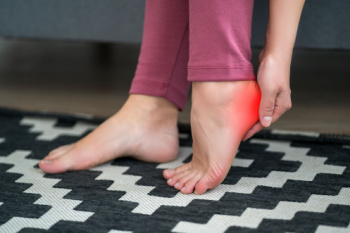 Heel spurs are bony growths that develop on the underside of the heel bone, often causing pain and discomfort, especially when walking or standing for long periods. They typically form in response to strain on the muscles and ligaments of the foot. Heel spurs are commonly associated with conditions like plantar fasciitis or repetitive stress injuries. Factors such as obesity, wearing unsupportive shoes, and having high arches or flat feet can also contribute to the development of heel spurs. Symptoms may include sharp pain in the heel, especially during the first steps in the morning or after a long period of rest. There are numerous options when it comes to treating or preventing the formation of heel spurs. Rest, stretching exercises, orthotic inserts, injections, or surgery in more severe cases may be necessary. If you are experiencing symptoms of heel spurs, it is suggested you seek professional evaluation and treatment from a podiatrist to ensure your pain is alleviated and your health is protected.
Heel spurs are bony growths that develop on the underside of the heel bone, often causing pain and discomfort, especially when walking or standing for long periods. They typically form in response to strain on the muscles and ligaments of the foot. Heel spurs are commonly associated with conditions like plantar fasciitis or repetitive stress injuries. Factors such as obesity, wearing unsupportive shoes, and having high arches or flat feet can also contribute to the development of heel spurs. Symptoms may include sharp pain in the heel, especially during the first steps in the morning or after a long period of rest. There are numerous options when it comes to treating or preventing the formation of heel spurs. Rest, stretching exercises, orthotic inserts, injections, or surgery in more severe cases may be necessary. If you are experiencing symptoms of heel spurs, it is suggested you seek professional evaluation and treatment from a podiatrist to ensure your pain is alleviated and your health is protected.
Heel spurs can be incredibly painful and sometimes may make you unable to participate in physical activities. To get medical care for your heel spurs, contact Wendy K. Stinson, DPM from New Jersey. Our doctor will do everything possible to treat your condition.
Heels Spurs
Heel spurs are formed by calcium deposits on the back of the foot where the heel is. This can also be caused by small fragments of bone breaking off one section of the foot, attaching onto the back of the foot. Heel spurs can also be bone growth on the back of the foot and may grow in the direction of the arch of the foot.
Older individuals usually suffer from heel spurs and pain sometimes intensifies with age. One of the main condition's spurs are related to is plantar fasciitis.
Pain
The pain associated with spurs is often because of weight placed on the feet. When someone is walking, their entire weight is concentrated on the feet. Bone spurs then have the tendency to affect other bones and tissues around the foot. As the pain continues, the feet will become tender and sensitive over time.
Treatments
There are many ways to treat heel spurs. If one is suffering from heel spurs in conjunction with pain, there are several methods for healing. Medication, surgery, and herbal care are some options.
If you have any questions feel free to contact our office located in Parsippany-Troy Hills, NJ . We offer the latest in diagnostic and treatment technology to meet your needs.
